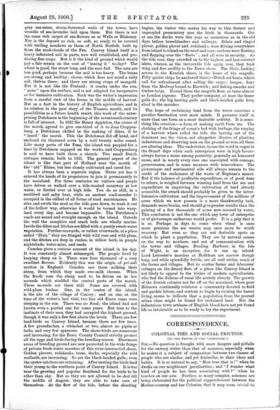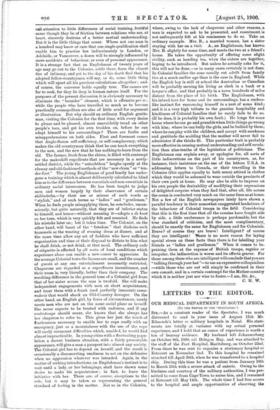CORRESPONDENCE.
COLONIAL TIES AND SOCIAL FRICTION. [TO THE EDITOR OF THE "SPECTATOR."]
Sin,—No question is fraught with more dangers and pitfalls for the unwary writer than that of manners, especially when he makes it a subject of comparison between two classes of people who are similar, and yet dissimilar, in their ideas and habits. It is so natural to say, " How true that is 1 " when he dwells on our neighbours' peculiarities ; and " I wonder what kind of people he has been associating with P" when he touches on our own. Further, so many complex schemes are being elaborated for the political rapprochement between the Mother-country and her Colonies, that it may seem trivial to call attention to little differences of social training, fruitful cause though they be of friction between relations who are, at heart, sincerely desirous of a better mutual understanding.
But it is the little things that count. Where not one man in a hundred may know or care that one single qualification shall enable him to practise law indiscrimately in London, or Adelaide, or Vancouver, a dozen will be strongly influenced by mere accidents of behaviour, or even of personal appearance.
It is a strange fact that an Englishman of twenty years of age may go out to the Colonies, settle there, form the closest ties of intimacy, and yet to the day of his death find that his adopted fellow-countrymen will say, or do, some little thing which will upset all his previous calculations altogether ; and, of course, the converse holds equally true. The causes are far to seek, for they lie deep in human nature itself. For the purposes of the present discussion it is obviously necessary to eliminate the " bounder" element, which is offensive per se ; while the people who have travelled so much as to become practically cosmopolitan are also of little avail for argument or illustration. But why should an ordinary English gentle.
Man, visiting the Colonies for the first time, with every desire to please and be pleased, almost unavoidably tread on other people's toes, and get his own trodden on, before he can adapt himself to his surroundings P There are faults and misapprehensions on both sides. First and foremost comes that Anglo-Saxon self-sufficiency, or self-complacency, which
makes the old countryman think that he can teach everything
to the new, and the new that he has nothing to learn from the old. The farmer, fresh from the shires, is filled with contempt for the makeshift expedients that are necessary in a newly.
settled district, while the " autochthon " laughs openly at the clumsy and old-fashioned methods of the " new chum " or " ten- der-foot." The young Englishman of good family has under- gone a training which is almost deliberately calculated to blind him as to the difference between essentials and non-essentials in ordinary social intercourse. He has been taught to judge men and women largely by their observance of certain
shibboleths,—by their use or misuse of such words as " stylish," and of such terms as " ladies " and " gentlemen." When he finds people Misapplying these, he concludes, uncon- sciously, but quite naturally, that they are of inferior status to himself, and hence—without meaning it—adopts a de haat en bas tone, which is very quickly felt and resented. He finds his mistake later on ; but it takes time. The Colonist, on the other hand, will boast of the " freedom " that disdains such trammels as the wearing of evening dress at dinner, and at the same time allow any set of faddists who have sufficient organisation and time at their disposal to dictate to him what he shall drink, or not drink, at that meal. The ordinary code of etiquette is affected by all sorts of local conditions which experience alone can enable a new-comer to appreciate. In the average Colonial town the houses are small, and the number of guests at any one entertainment necessarily restricted. Chaperons are regarded as a superfluous incumbrance, and their room is, very literally, better than their company. The resulting difference in the general tone of a Colonial girl from that of her sister across the seas is twofold. She will make independent engagements with men on short acquaintance, and treat them with a frank (and perfectly innocent) cama- raderie that would shock an Old-Country dowager. On the other hand, an English girl, by force of circumstances, rarely meets men who are not on the same social plane as herself. She never expects to be treated with rudeness, and if any contretemps should occur, she knows that she always has her chaperon to refer to. This gives her just the touch of fearlessness necessary to enable her to cope coolly with an emergency, just as a mountaineer with the use of the rope will easily surmount difficulties which, unaided, he would find almost impracticable. In young cities with a fluctuating popu- lation a decent business situation, with a fairly presentable appearance, will give a man a passport into almost any society. The Colonial girl has to depend on herself, and the result is occasionally a disconcerting readiness to act on the defensive when no aggression whatever was intended. Again, in the matter of seeking introductions, an Englishman's instinct is to wait until a lady, or her belongings, shall have shown some desire to make his acquaintance ; in fact, to leave the initiative with her. There are, of course, exceptions to the rule, but it may be taken as representing the general standard of feeling in the matter. Not so iu the Colonies, where, owing to the lack of chaperons and other reasoim, a man is expected to ask to be presented, and resentment is not unfrequently felt at his remissness to do so. Take an ordinary example. Mrs. B., a married woman, has a sister staying with her on a visit. A., an Englishman, has known Mrs. B. slightly for some time, and meets the two at a friend's house. He takes the opportunity of offering some slight civility, such as handing tea, when the sisters are together, hoping to be introduced. But unless he actually asks for it, this will not be done,—or in many cases certainly is not done. In Colonial families the sons usually cut adrift from family ties at a much earlier age than is the case in England. While the English boy is still at school the Australian or Canadian will be probably earning his living as clerk in a bank or a lawyer's office, and that probably in a town hundreds' of miles distant from the place of his birth. The Englishman, with his inbred love for home and its surroundings, has a cuckoo. like instinct for ensconcing himself in a nest of some kind ; and it is a very high tribute to the genuine hospitality and kindliness of Colonial families that he rarely fails to do so. (If he does, it is probably his own fault.) He longs for some house where he can go and grumble when little things go wrong with him; where he can bully the girls, and be bullied by them ; where he can play with the children, and accept with meekness and gratitude the scolding that the mother will never fail to administer if she thinks fit. This particular trait is probably more effective in causing mutual understanding and self-revela- tion than nine-tenths of the legislation of politicians. The Englishman can explain away, or apologise for, all sorts of little indiscretions on the part of his countrymen, as, for instance, their insistence on the use of the letters U.S.A. in addressing letters to Canada, or their travelling in the Colonies (this applies equally to both sexes) attired in clothes which they would be ashamed to wear outside the precincts of their own park at home. He may also be able to impress on his own people the desirability of modifying their expressions of delighted surprise when they find that, after all, life across the ocean is conducted very much on the same lines as at home. Not a few of the English newspapers lately have shown a parallel tendency in their somewhat exaggerated laudations of the behaviour of Colonial troops in the field. Considering that this is the first time that all the cousins have fought side by side, a little exuberance is perhaps pardonable, but the true standard of criticism, and the most complimentary, should be exactly the same for Englishmen and for Colonials. Brave ? of course they are brave ! Intelligent P of course they are intelligent ! %ere is no more reason for laying special stress on these facts than there is for labelling your
friends as "ladies and gentlemen." When it comes to be.
praising them at the expense of British troops, regular or irregular, the indiscretion is worse and its effects graver. For those among them who are intelligent will conclude that you are " talking through your hat "—to use an expressive colloquialism —while those who are not will simply be confirmed in their own conceit, and in a certain contempt for the Mother-country which it is neither just nor wise to foster.—I am, Sir, &c., C. H. W.



































 Previous page
Previous page